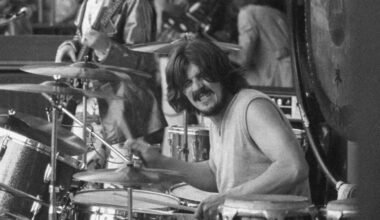Anthony Kiedis may not be the first name that comes to mind when we think of lyricists following in the footsteps of Bob Dylan, but his admiration for the iconic songwriter reveals a deeper connection to the art of storytelling in music.
While Red Hot Chili Peppers are known for their eclectic mix of playful, nonsensical tunes like “Hump De Bump” and heartfelt anthems like “Under the Bridge,” Kiedis found inspiration in Dylan’s ability to convey raw emotion and societal critique.
Kiedis, despite the humorous and carefree vibe of much of his band’s discography, approached his craft with a poet’s eye.
His appreciation extended from early hip-hop pioneers like Run-DMC to punk-poet Patti Smith, but when it came to the sheer depth and impact of lyricism, Dylan stood in a league of his own.
For Kiedis, Dylan was the gold standard of songwriting, especially in terms of addressing the human condition and capturing the political and cultural turbulence of the 1960s with songs like “Blowin’ in the Wind” and “Masters of War.”
In an interview with Rolling Stone, Kiedis placed Dylan among the top ten greatest musicians of all time, stating, “You really can’t argue with Bob Dylan’s music.”
And it’s true—Dylan’s lyrics, which blend the personal with the political, have left an indelible mark on rock music and inspired countless artists to explore more profound themes in their work.
Even Kiedis, whose catalog includes whimsical lines like “ding dang dong dong ding dang” from “Around the World,” owes part of his storytelling evolution to the boundaries Dylan pushed.
Dylan’s refusal to conform to the mainstream pop formula laid the groundwork for many artists, allowing them to explore their authentic voices.
Kiedis’s transition from lighthearted tracks to more introspective songs like “Knock Me Down” reflects this legacy. While the Chili Peppers’ music might seem worlds apart from Dylan’s folk rock, both artists share a common thread: the desire to communicate truth through music, whether it’s packaged in playful or profound lyrics.
Kiedis’s love for Dylan transcends a simple admiration of his musical catalog. It’s a recognition that Dylan’s willingness to defy expectations and break the mold gave future generations the freedom to do the same.
Even if Dylan’s signature gravelly voice isn’t on Kiedis’s party playlist, his influence on songwriters, whether they realize it or not, is undeniable.
As Kiedis’s work shows, Dylan’s legacy lives on not only in songs of protest but also in the very idea that music can be a vessel for personal and cultural expression.







